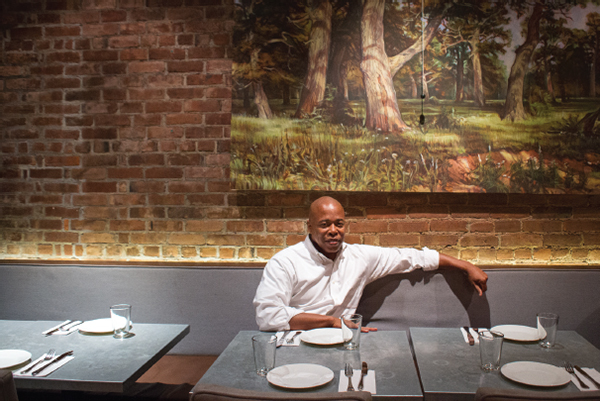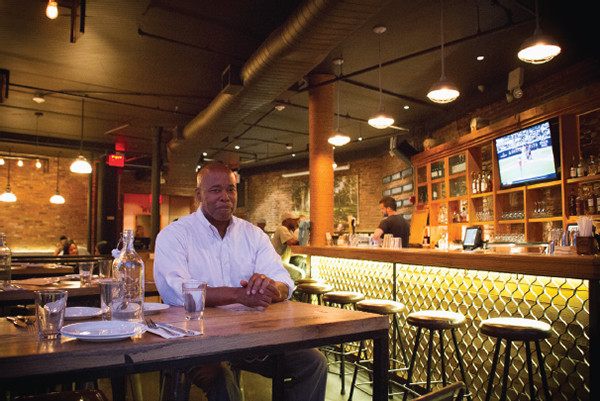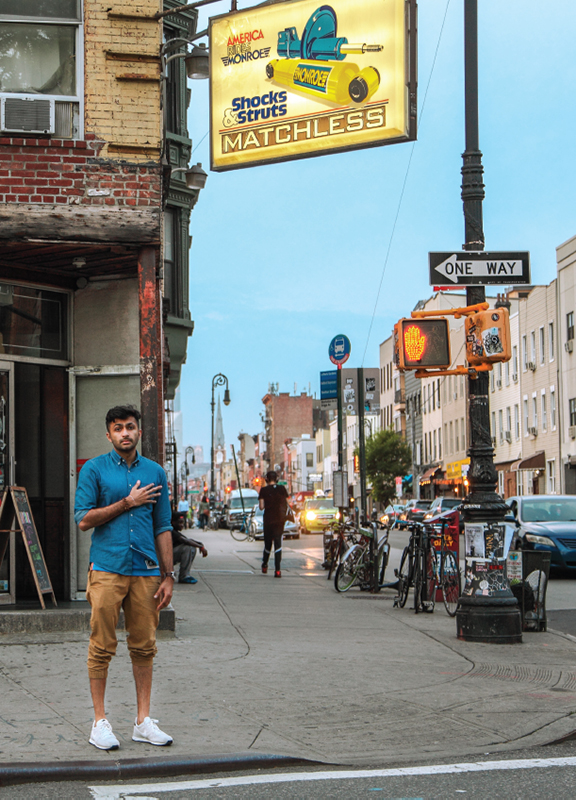

Brooklyn Borough President Eric Adams Watches the Room from His Corner Booth at Woodland
When the Brooklyn borough president arrived at the farm-to-table restaurant Woodland on the border of Prospect Heights and Park Slope, the waitstaff directed us straight to his corner booth in the back. They know and love Eric Adams here. Before he ordered his plate of lamb—to which he also added kale, avocado, lettuce, nuts and berries, tomatoes, pears, and no dressing!—the server had Mr. Adams’s signature drink ready: two glasses of red cabernet so that he could mix in some Pellegrino. “I like the effervescence,” he told me as he created his own carbonated rosé. It’s not the down ’n’ dirty drink you’d expect from a man of Eric Adams’s stature: a Brooklyn-born former NYPD captain with twenty-two years on the force, a four-term state senator, a landlord of a building in Bed-Stuy (“as long as my tenants are there, I’ll never raise their rent”), a fifty-four-year-old man as smooth and yet coolly intimidating as Ving Rhames. Eric Adams is a presence. And yet, he is so inviting, open, and in his own description, “authentic.”
So what does a borough president do, again? I wondered the same thing. “My role is to make sure that all of our city agencies are giving Brooklyn its fair share of resources,” he explained. “And then I must look at how to use my capital dollars. This year was $52 million. How do I effectively use my bully pulpit to push for education, employment, health care, [and] planning of the borough as we go through these new developments and changes? How do we maintain our character as we grow into this new borough that we are?” The borough president doesn’t have the power of the mayor, but he does have the mayor’s ear. Which is great training, because Eric Adams has his own mayoral aspirations, and he’s made no secret of it.
In the open air of Woodland, and as patrons intermittently approached to shake Mr. Adams’s hand, we talked about the role this restaurant that he visits weekly plays in his personal and political life.

This is my Cheers; everyone knows my name and everyone is glad I came.
This is my table. I sit here in the corner, and I’m able to look at the place, look outside. You often catch me here after the place closes, and I’m just sittin’ here, absorbing the quietness of the restaurant. There’s something mystifying about being in a restaurant after everyone is gone. Although the bodies left, the energy and the spirit of the conversation is still there.
I love the exposed brick. I love the wood. I love where it sits on the corner of Sixth and Flatbush, and no matter what time of day, you’re never alone because there’s always traffic on Flatbush Avenue. The glass allows you to see out. The waiter dimmed the lights to give me an opportunity to look out without everybody being able to see me. It’s a nice serene place that I enjoy a lot. Though it’s in the heart of a busy area, it can also be a quiet place.
My day is always grabbing, conversation, talking. Because I’m very authentic about being around and liking to help people, people feed on that. You go to a typical event, and you’ll see that people are constantly engaging with me, talking with me, pulling. This moment is a moment that I’m pulling into my Sunoco and refueling. It’s a pit stop. Once I’m out there, I’m always on, all the time, no matter where I am. It’s nonstop. From the time you wake up to the time at the end of the night, which is often around two or three in the morning.
You often catch me here after the place closes.
The place sort of adopted me. The waitresses, the people who are here, just really embraced me. It was too difficult not to come back. They weren’t doing it for a tip because even those who were not serving my table would come to talk about some of the things that they enjoyed that I did or was a part of, and there was really a desire to say, “Please come back.”
All of a sudden, overnight, the planet found us. We were this hard, blue-collar—nobody liked us. Who wanted to live in Brooklyn? Now, overnight, these tall buildings came, and we became cool. It reminded me of a girl I dated back when I was in college. Throughout her young years, she was overweight but gorgeous. She finally committed to getting herself in shape. She became this really hot, fit young lady. All of a sudden the onslaught of people who found her attractive happened too quick. She went from the ugly duckling to this hot girl. That’s what Brooklyn is. Brooklyn is this unattractive, could-never-go-to-the-prom borough. And now, not only does everyone want to take you to the prom, but everyone wants you on their arm. Everyone wants to wear the shirt: “Brooklyn.” They want to wear the cap. They want to walk around and hope that someone will say, “Where do you live?” so that they can say, “Brooklyn.” It’s scary because we have to be ready for it. We have to be mature enough to embrace this new role we have. We can’t lose our character.


I don’t believe that one should shun the hipsters and say, “That’s not Brooklyn.” Yes, it is Brooklyn. Brooklyn is old and it’s new. What the hipsters bring with their artists and culture and their skinny jeans and their beards is all part of the Brooklyn brand.
Everyone wants to wear the shirt: “Brooklyn.”
When I say to people I want to be mayor one day, it would be a proud honor for the people of the city to say, “You served us well as a police officer protecting our families; you served us well at the state senate as you pushed through tough legislation in Albany; you served us well as borough president and what you’re doing around children and families in the borough—now we want to give you a right to serve us again.” Because the people give you the right to serve them. I was never elected to be served, I’m elected to serve. I’m still a cop on the beat. I’m still responding to the calls of service.
I’m afraid to not be helpful. I’m afraid to not be there for people. I think tied to my blessings is my ability to bless other people by helping them. And once I stop, I think I’m going to lose all that I have. I’m petrified to stop doing those little things, those everyday things. Jesus used to clean the feet of people to show how humble he was. We need more symbols to show how humble we are. I’m able to live this life I live because of that symbol. If I screw up and lose sight of that, I’ll lose everything. As Dr. King said, there’s a moral arc in the universe. I don’t play with it. I don’t joke with it. I stay committed with it. And I stay authentic to it. I got to serve if I want to continue to enjoy this blessed life that I have. My life is blessed.
I had a fund-raiser here and the mayor stopped by. His people told me, “Listen, the man’s gotta get in and out. He has a solid fifteen minutes. He has a busy schedule.” He came. Mayor [De Blasio] did his speech. He sat down a little while. Three hours later, his people came to him and said, “Come on.” He got so wrapped up in the atmosphere. I’m sure he had a full day that day where he had to be on message, on point. He was able to come here and just be Bill again. Not be in the fishbowl. Just laugh and BS and joke. He said, “You know what? I miss this.” It really talks about the energy that’s here in this place. That speaks to why I enjoy this place.
I’m afraid to not be there for people.
Enjoyment is not always what you can see and touch. Enjoyment is what you can feel. Great moments are something that stay with you. And we’ve had some great moments in here. And some tough decisions.
I fit into Woodland. I fit into the diversity of this community. The music in the background can go from rap to reggae to new wave. The human psyche is so amazing. It’s like a sponge. We absorb so much without even realizing it. We really don’t even fully understand why we enjoy something because there are so many different dimensions: the smell, the taste, the sound, the feeling. When I walked into my home the first time after seeing twenty homes I didn’t need anybody to tell me this is the one, I knew it. You go on a date with a young lady and you realize, “You know what? I like this one.” That’s what this place is like.
There are hundreds of thousands of restaurants in this city, but when I sit here in the corner and just listen to all these different sounds—sometimes I’m here alone and the conversations are going on, the music is going on, and the weather’s nice, the feeling is nice, and I say, “You know what? This is it.” That is what Woodland is. Woodland is it.
August 26, 2015

(Photos by Phil Provencio)